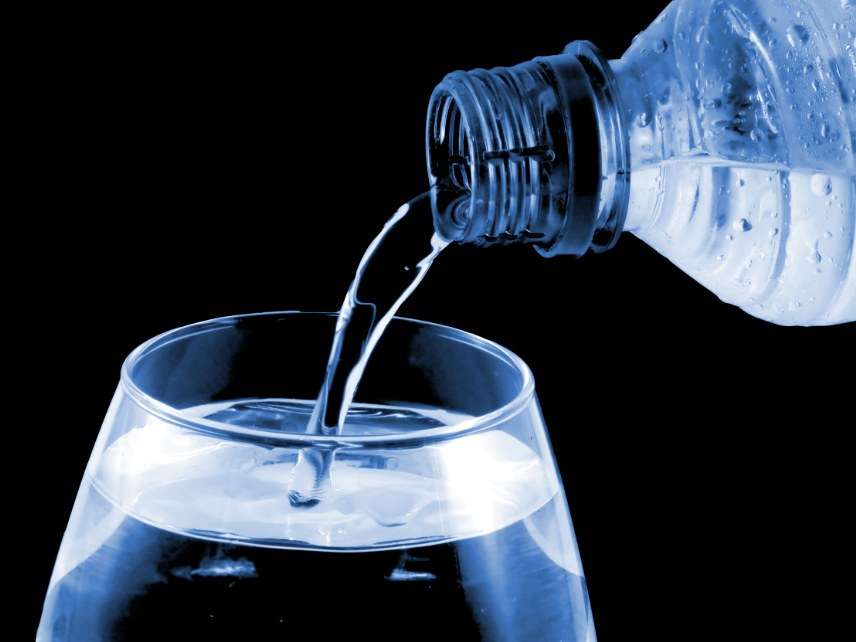Lawsuit Shows Muddied Waters over What Counts as 'Spring Water'
A lawsuit alleges Poland Spring Water amounts to "a colossal fraud perpetrated against American consumers."

Earlier this month, a group of plaintiffs filed a federal class-action lawsuit against food and beverage maker Nestlé. The 325-page suit, filed in U.S. District Court in New Jersey, argues Nestlé's Poland Spring Water is not actually spring water but is instead "common groundwater that doesn't meet the [FDA] definition of spring water."
Consequently, the suit claims, Poland Spring Water's marketing amounts to "a colossal fraud perpetrated against American consumers." The suit seeks damages and injunctive relief for the alleged fraud under both federal law and the consumer-protection laws of several states.
The lawsuit comes just as Poland Spring plans to open a new $50 million bottling facility in Maine, where it plans to add 80 new jobs.
The company refutes the claims in this month's lawsuit.
"[T]he claims made in this lawsuit are without merit and an obvious attempt to manipulate the legal system for personal gain," the company says in a statement. "We are highly confident in our legal position and will vigorously defend ourselves against the frivolous claims in this lawsuit."
This isn't the first time Poland Spring has landed in hot water (so to speak) over its marketing claims. The company settled a 2003 class-action lawsuit, filed in state court in Connecticut, that claimed, the New York Times reported at the time, "Nestlé draws its water from a site 30 miles away from the original Poland Spring and often uses ground water and a spring that is near the site of a former garbage dump."
Bottled water sales and marketing are tightly regulated. Though there are myriad rules that apply to bottled water, no rules require a bottled water maker to identify its source.
For example, neither Aquafina (Pepsi) nor Dasani (Coca-Cola) claims to be a "spring water." Both source their water from municipal water supplies. They sell packaged tap water, in other words, and don't claim otherwise.
Fiji, on the other hand, markets its spring water as "spring water." Its spring water comes from springs in Fiji.
When a seller chooses to make claims about its source—such as Fiji and Poland Spring—then they open themselves up both to government scrutiny and lawsuits if those claims are of dubious validity.
FDA rules, for one, state that water may be referred to as "spring water" only if the water is 1) collected at the spring or via "a bore hole tapping the underground formation feeding the spring" and 2) the location of the spring is identified.
Poland Spring indicates online that its waters come from eight springs in Maine. The company admitted in 2013 that about one-third of its spring water came from Poland Spring. Today, Nestlé isn't exactly hiding the ball about its use (or lack thereof) of Poland Spring's eponymous spring. The company's website notes they "no longer use the original Poland Spring source" to bottle their water.
So who's right here: Nestlé, or the people suing them? I don't really have an opinion. As I've written countless times, questions such as whether Nestlé's Poland Spring Water is or is not fraudulent are exactly the sort of matters that are best addressed by courts.
This is part of my belief, firmly rooted in the First Amendment, that food labels should be open "to any and all statements that aren't demonstrably false," as I wrote in a 2012 column. Who should decide the question of falsity? Courts.
That's the ideal outcome for any First Amendment question. But the FDA's involvement in crafting definitions for foods of many sorts—known as "standards of identity"—unfortunately serves to muddy the waters.
Like every standard of identity, the FDA's standard of identity for spring water, which the plaintiffs in the present lawsuit cite in support of their claims, tends to confuse consumers and food makers alike, and can spur litigation where none might otherwise exist.
Remember the lawsuit challenging a Florida standard of identity for skim milk that said a small creamery in the state couldn't label their 100% pure skim milk as "skim milk" because they hadn't added something to the milk? (I remember. I served as an expert in the case on behalf of the creamery.) Recall the Just Mayo lawsuit, which centered around the FDA's idiotic standard of identity for mayonnaise? How about a New York State standard of identity that attempted to force an almond milk maker to call their almond milk by the downright bizarre name "melloream" instead? I discuss all of these examples and more cases of outlandish standards of identity in my recent book, Biting the Hands that Feed Us: How Fewer, Smarter Laws Would Make Our Food System More Sustainable.
Ninety-nine years ago, a long-running publication known as The Youth's Companion provided a fascinating post-mortem of Rose-Quartz Spring, a Poland Spring competitor in Maine that had met its demise after selling spring water that'd been contaminated with dirt and vegetation.
"There is probably no commodity in the world that depends so much on a reputation for purity as spring water," the weekly noted.
That's probably still true today. And while the question 100 years ago may have been whether a spring water was truly pure, the issue today centers more on whether a spring water is truly a spring water.


Show Comments (28)